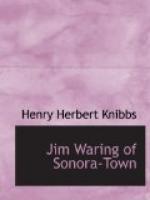Lorry dismounted and tied the pack-horses. He explained that they were still a little too close to home to be trusted untied.
Dorothy decided that she was hungry, although they had been but two hours on the trail. Could they have a real camp-fire and make coffee?
“Yes, ma’am; right quick.”
“Lorry, don’t say ‘yes, ma’am.’ I—it’s nice of you, but just say ‘Dorothy.’”
“Yes, ma’am.”
Dorothy’s brown eyes twinkled.
Lorry gazed at her, wondering why she smiled.
“Yes, ma’am,” she said stiffly, as though to a superior whom she feared.
Lorry grinned. She was always doing something sprightly, either making him laugh or laughing at him, talking to the horses, planning some little surprise for their occasional dinners in the Bronson cabin, quoting some fragment of poetry from an outland song,—she called these songs “outlandish,” and had explained her delight in teasing her father with “outlandish” adjectives; whistling in answer to the birds, and amusing herself and her “men-folks” in a thousand ways as spontaneous as they were delightful.
With an armful of firewood, Lorry returned to the spring. The ponies nodded in the heat of noon. Dorothy, spreading their modest luncheon on a bright new Navajo blanket, seemed daintier than ever against the background of the forest. They made coffee and ate the sandwiches she had prepared. After luncheon Lorry smoked, leaning back against the granite rock, his hat off, and his legs crossed in lazy content.
“If it could only be like this forever,” sighed Dorothy.
Lorry promptly shook his head. “We’d get hungry after a spell.”
“Men are always hungry. And you’ve just eaten.”
“But I could listen to a poem,” he said, and he winked at a tree-trunk.
“It’s really too warm even to speak of ‘The Little Fires,’ isn’t it? Oh, I know! Do you remember the camp we made?”
“Where?”
“Oh, silly!”
“Well, I ain’t had time to remember this one yet—and this is the first for us.”
“Lorry, you’re awfully practical.”
“I got to be.”
“And I don’t believe you know a poem when you see one.”
“I reckon you’re right. But I can tell one when I hear it.”
“Very well, then. Shut your eyes tight and listen:—
“’Do you remember the camp we made as
we nooned on the mesa
floor,
Where the grass rolled down like a running
sea in the wind—
and the world
our own?
You laughed as you sat in the cedar shade and said
’t was the
ocean shore
Of an island lost in a wizardry of dreams,
for ourselves alone.
“’Our ponies grazed in the idle noon,
unsaddled, at ease, and
slow;
The ranges dim were a faeryland; blue
hills in a haze of gray.
Hands clasped on knee, you hummed a tune, a melody
light and
low;
And do you remember the venture planned
in jest—for your
heart was gay?’”




